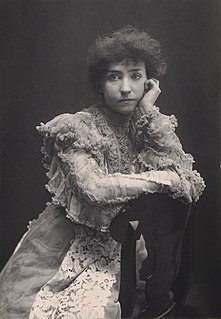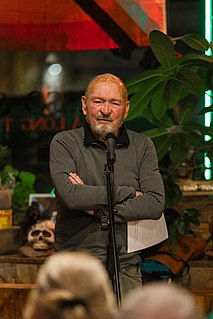A Quote by Minnie Maddern Fiske
Many a play is like a painted backdrop, something to be looked at from the front. An Ibsen play is like a black forest, somethingyou can enter, something you can walk about in. There you can lose yourself: you can lose yourself. And once inside, you find such wonderful glades, such beautiful, sunlit places.
Related Quotes
You find yourself by losing yourself. By not thinking about yourself all of the time. When I am in a slump with my writing, I'll go and walk for a week. Walk and not see a human being. Something happens after four or five days which is quite wonderful. It is an ancient thing. Your sense of smell. Your hearing. They come back.
Becoming awarrior and facing yourself is a question of honesty rather than condemning yourself. By looking at yourself, you may find that you've been a bad boy or girl, and you may feel terrible about yourself. Your existence may feel wretched, completely pitch-black, like the black hole of Calcutta. Or you may see something good about yourself. The idea is simply to face the facts. Honesty plays a very important part. Just see the simple, straightforward truth about yourself.
Give up defining yourself - to yourself or to others. You won't die. You will come to life. And don't be concerned with how others define you. When they define you, they are limiting themselves, so it's their problem. Whenever you interact with people, don't be there primarily as a function or a role, but as the field of conscious Presence. You can only lose something that you have, but you cannot lose something that you are.
When I was a kid, I thought I saw a ghost in the forest when I was on a bush walk, like a walk through the forest. I saw something weird pass from one side of the track to the other, and it was sort of a white, blurry... it's hard to describe, really - something that was almost see-through, but it just moved in front of me.
One of the few things I know about writing is this: spend it all, shoot it, play it, lose it, all, right away, every time. Do not hoard what seems good for a later place in the book, or for another book; give it, give it all, give it now. . . . Something more will arise for later, something better. These things fill from behind, from beneath, like well water. Similarly, the impulse to keep to yourself what you have learned is not only shameful, it is destructive. Anything you do not give freely and abundantly becomes lost to you. You open your safe and find ashes.
I never like to play for myself, and that is why I don't own a grand piano. To play for yourself is like looking at yourself in a mirror. I like to practice; that is to work at a task. But to play there must be an audience. New things happen when you play for an audience. You don't know what will occur. You make discoveries with the music, and it is always the first time. It is an exchange, a communion.
You go from being with the guys all the time in the locker room, in practice, having a militarized brain in terms of this schedule, and then, all of a sudden, you are on your own. You lose a sense of purpose; you lose a sense of yourself. And you lose confidence. You find yourself saying, 'I was the best at this, and now I'm not the best.'
Maybe you play a melody twice. You play it once like you like it, and some parts that you don't like you can just switch. An eight-bar motive - you can just take it and put it in the front or back or something like that. It can save you 50 or 60 or 70,000 dollars, a drum machine. That's why everybody uses it.



































